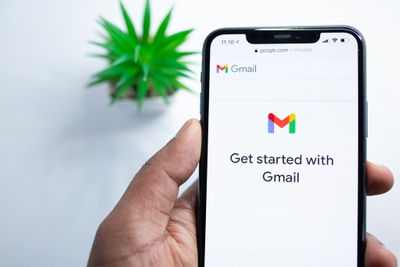What Is the Difference Between a Personal Email Address and a Professional Email Address
A professional email address is an office-related address that uses a company name, while a personal email address is an address related to an individual's name. Professional email addresses have the company name in the address, while personal addresses can contain a nickname, hobby, or other personal affiliation. Both are typically used for different purposes, such as professional communication at the office and personal interaction between friends and family.Table of Contents:
-
What is a Professional Email Address
- What is a Personal Email Address
- Considerations for Professional Email Addresses
- Possible Use Cases for Personal Email Addresses
- Maintaining Professionalism
- Keeping Business and Personal Email Separate
- Creating Domain-Level Email Addresses
- How Email Works
- What is a Personal Email Address
- Considerations for Professional Email Addresses
- Possible Use Cases for Personal Email Addresses
- Maintaining Professionalism
- Keeping Business and Personal Email Separate
- Creating Domain-Level Email Addresses
- How Email Works

What is a Professional Email Address
A professional email address is one that is used for work-related communication. Generally, professional email addresses follow the format of firstname.lastname@company.com. They are different from personal email addresses where a person can be more flexible with the address, such as using their nickname or including a number or phrase.Professional email addresses are important because they provide a sense of credibility and professionalism. A good professional address exudes the impression that the person is organized and reliable, making it easier to establish trust and respect. Furthermore, a professional email address can be easily used when applying for jobs, as it helps employers identify the applicant quickly.
Overall, when choosing an email address, it helps to be mindful of your professional goals. Having a professional email address will help create a positive, professional impression and demonstrate your commitment to work.
Do you need a website? Want to build a website but don't know where to start? Our website builder is the perfect solution. Easy to use, and with the ability to customize to fit your business needs, you can have a professional website in no time.
What is a Personal Email Address
A personal email address is an email that is used exclusively for sharing personal topics with family, friends and acquaintances. It might include a combination of your name, hobbies or interests. For instance, johnsmith23@outlook.com could be a personal address.Unlike a professional email address that is typically used for business matters, a personal email address is not usually associated with a company, organization or school. It also does not include any professional branding or time-related titles. In addition, its subject lines do not reflect any goal or deadline.
Considerations for Professional Email Addresses
When deciding between a personal and a professional email address, there are several important considerations to keep in mind.Above all, your professional email address should be a reflection of your professional identity. It should be easy to remember and make sense to potential employers and clients. Avoid using nicknames or informal language, and steer clear of anything that might appear unprofessional.
Likewise, your professional email address should include your first and last name. If your exact name is already in use, try using a slight variation—such as adding a number or a middle initial—that will make your address unique.
You should also be aware of any potential restrictions that your workplace may have in place regarding professional email addresses. Make sure you read any applicable policies before deciding on an address.
Using the same professional address for your job-search correspondence and your everyday work-related emails will help you keep your digital identity consistent.
Finally, be aware that certain email addresses can show up in employer databases. This can be a great way to network, so make sure your address is up to date when applying for jobs.
Building a website with SITE123 is easy
Possible Use Cases for Personal Email Addresses
Personal email addresses are commonly used by individuals for any number of purposes. They can be used to communicate with family and friends, as well as to create online accounts like social media platforms and online shopping sites. Personal email addresses can also be used to keep in contact with other professionals and colleagues, as well as any other online contacts.An example of a common use case for a personal email address is the ability to create multiple email accounts with the same provider. This allows users to create accounts with different email addresses and passwords, which makes it easier to differentiate emails sent to specific individuals or groups of contacts. Additionally, personal email addresses can be used to manage multiple calendars, storage of files, and contact information.
Another important use for a personal email address is the ability to maintain an online identity without having to use one's work or government email address. Using a personal email address allows people to have control over what details of their life they share with the public. This can be beneficial for personal branding, remaining anonymous, and helping to protect one's privacy.
Maintaining Professionalism
Maintaining professionalism is an important part of any business transaction, whether it is conducted in face to face contact or online. When there is a professional email address involved, it is important that it be kept up to date and used only for business purposes. Any response to a professional email should also be kept polite and professional.It is important to remember that a professional email address reflects not only on you, but on the organization with which you are affiliated. Emails should also be carefully proofread for spelling and grammar, as unprofessional emails can easily lead to confusion, frustration, and reflect poorly on the sender.
In addition, emails sent from a professional address should never include any private or personal matters. Stick to relevant business topics when using a professional email address and save casual conversations for more appropriate venues such as personal email contacts.
Keeping Business and Personal Email Separate
Having a personal email address for personal emails and a professional email address for business emails is one of the most important rules when it comes to the difference between a personal email address and a professional email address. Keeping the two separate is important not just for keeping professional communication professional, but also for avoiding potential legal issues.There are a few key things to keep in mind when it comes to keeping business and personal emails separate. First, don’t mix business and personal emails in the same inbox. Having separate inboxes for both is the easiest way to make sure that emails don't get lost in the shuffle.
Second, be sure to update your contact list to include both email addresses. This will help ensure that you don't accidentally send out business emails from your personal email address.
Lastly, be mindful of the content you are sending. Even if you are sending a professional email from your personal account, make sure it is appropriate and that you maintain your professional demeanor. Keeping business and personal emails separate will help you maintain a high level of professionalism.
Creating Domain-Level Email Addresses
Creating domain-level email addresses is a great way to differentiate your personal and professional emails. Domain-level emails are domain-specific, meaning they are specific to a business or website. For example, if you own a business, you might use a domain-level email address like mybusinessname@mybusiness.com. This makes it instantly recognizable as an email related to your business, instead of a personal email address like johnsmith@gmail.com.Domain-level emails can also look more professional, having a greater impact on making a good impression when you're sending an email to potential customers or employers. You can also use domain-level emails to create multiple accounts in your website so you can manage different aspects of your business, or even add additional security measures. Overall, creating domain-level email addresses is a great way to stay organized and have peace of mind when sending out emails for professional purposes.
How Email Works
Email is an important tool for communicating with colleagues, friends, and family. Understanding how email works is key to effectively using it to your benefit. Most emails are sent using email protocols like IMAP, POP3, and SMTP.An important distinction to make right away is between personal and professional email addresses. Personal email addresses are for private use, often associated with free email services like Gmail, Yahoo, or Hotmail, and don’t require any verification from the user.
Professional email addresses are generally used for business, require a domain name and are associated with a domain hosting service. They can be used for communication between business associates and may require authentication procedures for security purposes.
It’s important to be aware of the differences between different types of email addresses, as the protocol may be different depending on the type of email address.





